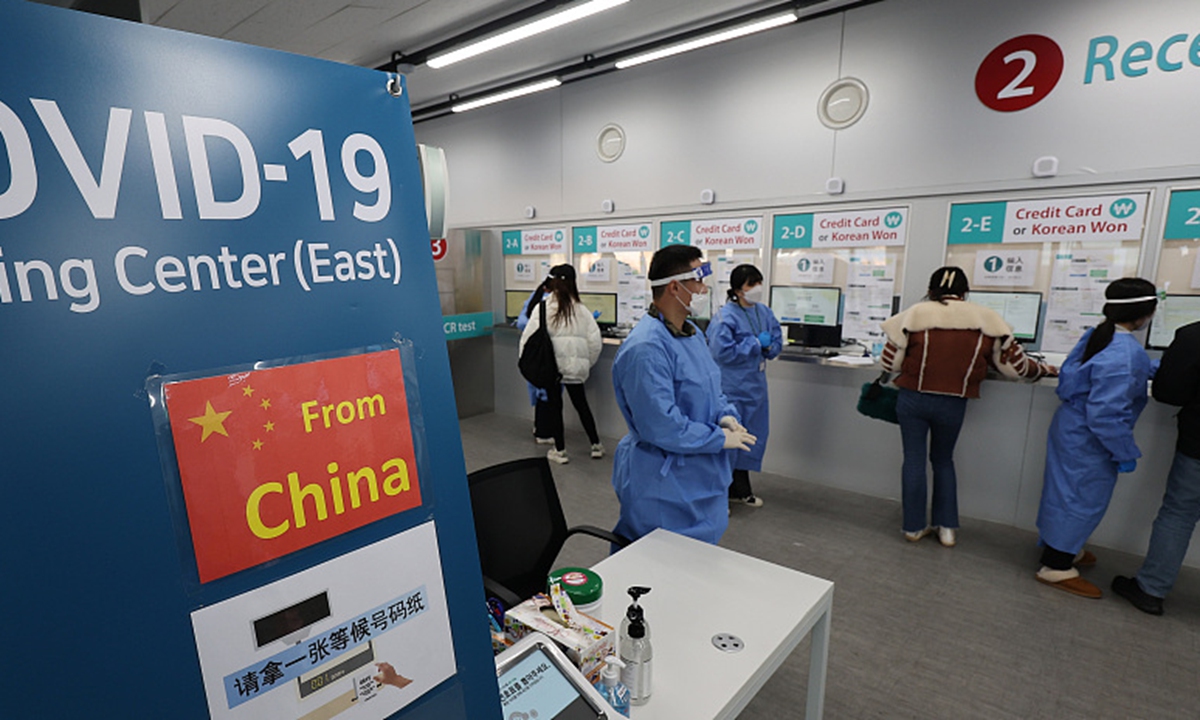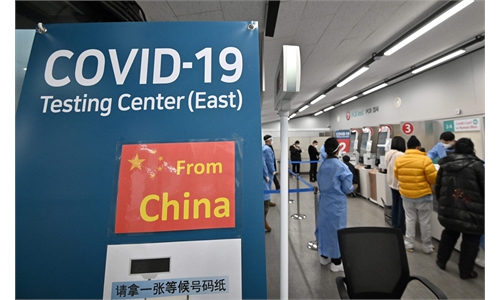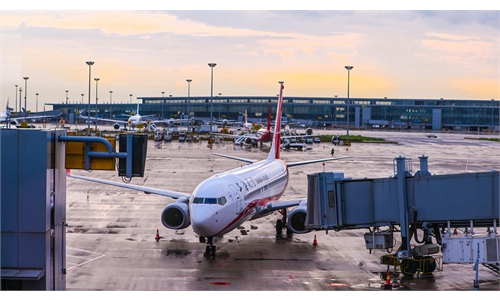Chinese Ambassador to S.Korea expresses concern over discriminatory entry policy, says China not responsible for visa issues

Health workers guide travelers from China at a COVID-19 testing center at Incheon International Airport in South Korea on January 3. Photo: VCG
China is not responsible for the current visa issuance issues between China and South Korea, Chinese Ambassador to South Korea Xing Haiming said. The ambassador expressed his concerns and regret over the unfair and discriminatory treatment toward Chinese nationals entering South Korea, media reported.
The South Korean authorities should conduct in-depth analysis of the matter, Xing said in an interview with China News Service. The authorities from the two sides should resolve the current difficulties and problems through friendly consultation to ensure the steady and smooth development of bilateral relations, Xing said.
China imposed its first countermeasure on Tuesday toward South Korea's discriminatory and unnecessary travel restrictions against travelers from China by suspending short-term visas for South Korean citizens.
China's National Immigration Administration on Wednesday also announced a decision to suspend the issuance of port visas and the 72/144-hour visa-free transit policy for citizens of South Korea and Japan.
The Chinese Foreign Ministry reiterated on Wednesday that China's action aims to protect the legitimate rights and interests of Chinese citizens and ensure the environment is suitable for normal exchange and cooperation between countries, which is fair and legitimate.
Since the beginning of the pandemic, China has been sharing information and data with the international community in an open and transparent manner, Chinese foreign ministry spokesperson Wang Wenbin said at Thursday's press briefing. "China has not only protected its own people's lives to the greatest extent possible, but also served as a major source of COVID response supplies for the world, making China an important participant in international cooperation against the virus," Wang noted.
However, the South Korean foreign ministry said that its government's antivirus measures against China were a "decision based on scientific grounds" to protect its people, according to Yonhap News Agency on Thursday.
Wang Junsheng, research fellow of East Asian studies at the Chinese Academy of Social Sciences in Beijing, said that it would be understandable if South Korea takes the same measures against travelers from all other countries, but those measures currently only target travelers from China, which is seen as discriminatory.
The COVID-19 cases from China accounted for just 1 percent of confirmed imported cases in South Korea during the past three years, according to data from South Korean health authorities. Even currently, the cases from China only account for a small proportion of the confirmed cases in South Korea, Dong Xiangrong, a senior fellow at the National Institute of International Strategy at the Chinese Academy of Social Sciences, told the Global Times on Thursday.
South Korea's approach to Chinese arrivals certainly looks like an overreaction. Nearly 30 million people have been reported infected with COVID-19 in South Korea, and given that the country has a population of more than 50 million and most of them have been vaccinated with booster shots, herd immunity has been developed, Dong said. Also, the BA.5 strain, which is currently circulating in China, has also been circulating in South Korea and will not have a significant impact on the country, according to Dong.
Some Chinese netizens also shared their unpleasant experiences after arriving in South Korea. A 22-year-old lady who requested anonymity told the Global Times that South Korean airport authorities gave her a yellow badge, as she was holding a short-term visa from China. She arrived in South Korea on Tuesday and had to take a nucleic acid test after arrival.
"Tourism is about experience. Since tourists are the source of profits, they need to be able to feel welcomed rather than discriminated against," Dong said.
The feeling of discrimination will greatly dampen Chinese people's enthusiasm to visit South Korea, which also goes against the country's wish to attract Chinese tourists, Dong noted.


